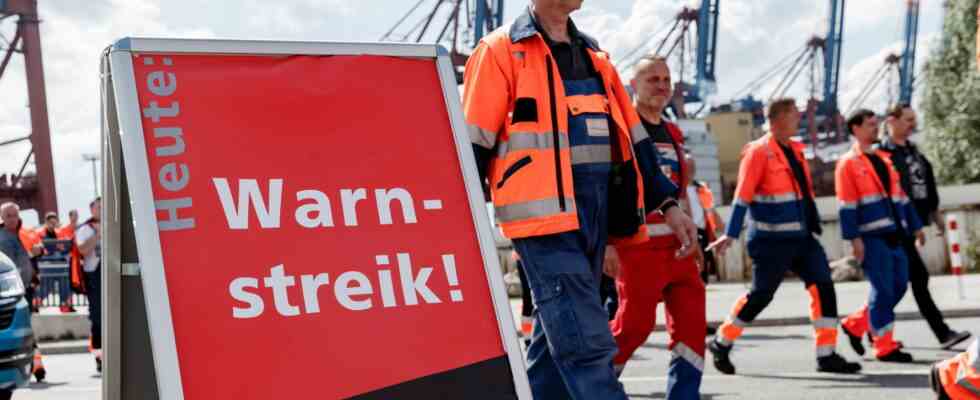Status: 22.06.2022 2:32 p.m
Even in the fourth round of negotiations, the union and the port operator could not agree on wage increases – now a strike is to be held for one day. This could increase the already massive delays in the ports.
The trade union ver.di has called on workers in some German ports to go on warning strikes in order to emphasize their wage demands. From Thursday morning, the employees, including those in the ports of Hamburg, Emden, Bremerhaven, Bremen, Brake and Wilhelmshaven, are to stop working for 24 hours.
Duration of the collective agreement disputed
In the fourth round of collective bargaining, the Central Association of German Seaport Companies (ZDS) presented a “final” offer that included higher hourly wages of up to 1.20 euros per hour more for port workers, as well as a one-time payment of up to 1,000 euros . ver.di is also demanding 1.20 euros per hour more, but with a shorter term of the collective agreement of one year and an “actual inflation adjustment”, which is not specified in detail.
ZDS negotiator Ulrike Riedel accused ver.di of not making any compromises. What the ports offer is already higher than inflation. ver.di should go together with the ZDS in an orderly mediation process, a strike is not proportionate. A collective agreement would apply to around 12,000 employees in 58 companies in Hamburg, Lower Saxony and Bremen.
ver.di negotiator Maya Schwiegershausen-Güth accused the ZDS of having worsened its offer from the previous round of negotiations: “We would have liked to have avoided another warning strike, but the offer now available, which has mostly been worsened, is unacceptable to us,” said you. In the third round of negotiations, the port workers had already stopped work for a few hours, for the first time in decades.
Ships back up in the North Sea
Dozens of ships are currently waiting to be cleared in the North Sea because of container shipping, which has gotten out of step as a result of the corona pandemic. According to the Kiel Institute for the World Economy, more than two percent of global freight capacity is stuck there and cannot be loaded or unloaded.
In the German Bight alone, 15 large container ships are currently waiting to be cleared in Hamburg or Bremerhaven – and there is no end in sight. After the end of the lockdown at the world’s largest container port in Shanghai, a wave of container freighters is now rolling towards Europe. The warning strike could now further aggravate the situation.

